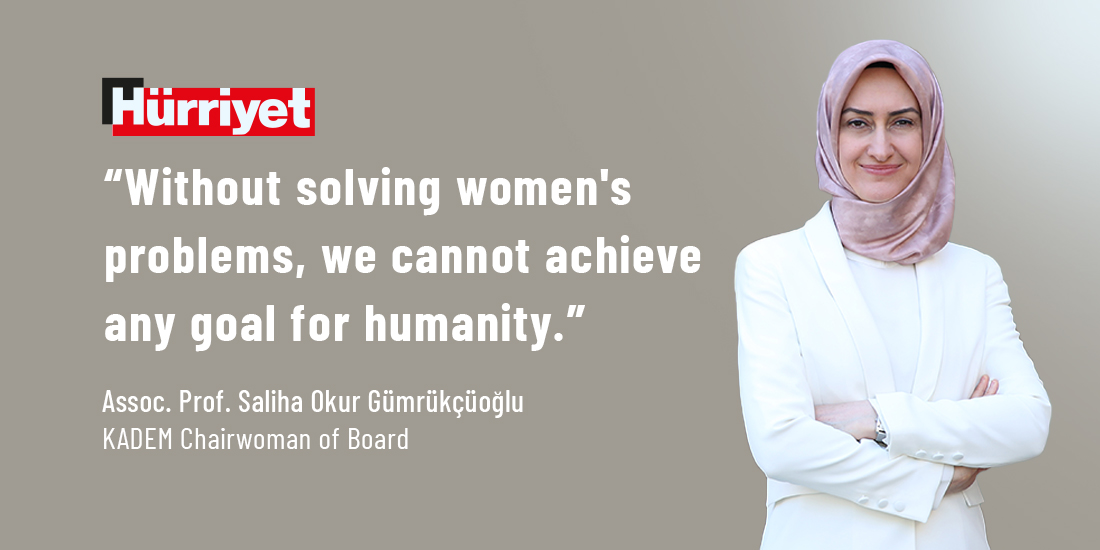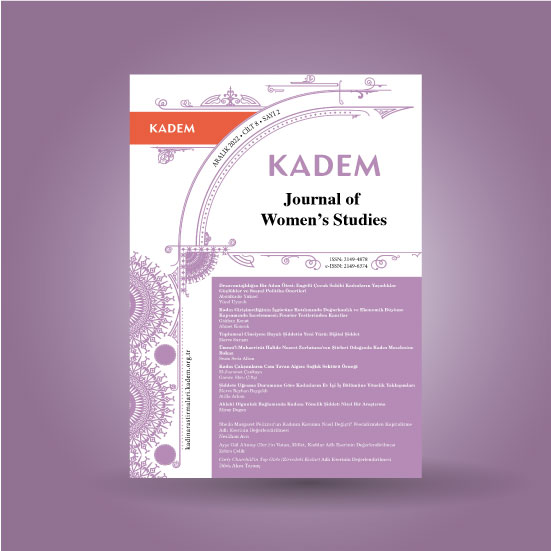President of KADEM Assoc. Prof. Saliha Okur Gümrükçüoğlu gave an interview to Hürriyet’s Hande Fırat on Women’s Rights
1.Following the withdrawal from the Istanbul Convention, women’s rights are once again on the political agenda. How do you see the discussion of women’s rights in a male-dominated political agenda?
Women’s rights is an issue that needs to be talked about and discussed by all segments of society…Institutions such as the state, civil society, academia, and all individuals, men and women, have a responsibility and duty regarding women’s rights. But of course, women’s issues cannot be solved by mechanisms in which women are not involved in decision-making and discussions in which they have no voice. As KADEM, we advocate for an increase in women’s representation and effectiveness in politics as in all areas of public life.
Discussing women’s rights as a political instrument and using them as material for ideological disputes causes great harm not only to women but also to society.
Our biggest goal is for women to achieve their rights, to take part in all areas of social life and to establish equal opportunities. Because without solving women’s problems, we cannot achieve any goal for humanity.
2.What is the importance of Law No. 6284? What would be the possible outcomes of the proposed changes or compromises that could be made in this law under the alleged reason of protecting the family?
In our country, Law No. 6284 is the most important law containing measures to prevent violence and protect victims of violence. This includes all persons who have been or are at risk of being subjected to attitudes and behaviors defined as violence in the law, and all persons who have been or are at risk of being affected by violence. In other words, 6284 covers not only women but everyone who is subjected to violence. It is also vital to protect women, the family and children.
In addition to actual violence, it also has a protective and preventive role in cases of potential violence. In other words, there are two different types of safeguards under the law: protective and preventive. The issue here is to protect family members who are victims of violence and to take preventive measures.
This law makes it possible to ensure inter-institutional coordination in combating violence. Individuals at risk of violence are protected through mechanisms such as ŞÖNİM, counseling centers and guest houses. Besides, in the provision of support and services to victims of violence, a fair, effective and rapid procedure based on fundamental human rights and in accordance with the principle of social state is pursued. The interim decisions taken for the victim and the perpetrator of violence are carried out in a manner befitting human dignity.
As for protecting the family: Protecting the family starts, of course, with protecting all members of the family. It is extremely wrong to present these two issues as alternatives to each other… Violence against women is a violation of human rights. It is a crime against humanity that the whole world is fighting against. And most importantly, it is an issue above politics.
At this point, our common focus as the state, NGOs, educators, families and all individuals, men and women, should be on what can be done to increase the gains in women’s rights and prevent violence against women. All individuals and institutions must act on this issue, perhaps with different methods and instruments, but with a common goal in mind.
Women have rights and legal gains that they have acquired with great difficulty and at great cost throughout history. Protecting these rights and gains does not create any political or social imbalance. Because to protect women is to protect humanity.
In other words, discussing Law No. 6284 as a tool for political bickering means taking away the rights that women have gained by paying high prices for many years; it means compromising a life in which women are safe and secure.
3. Is Law No. 6284 sufficient or should new measures be taken?
It is not enough, but it is nevertheless one of the most effective administrative and judicial measures.
We can see that in recent years, significant legal gains have been achieved in protecting women and combating violence. Serious steps have also been taken to protect women through legislation. With egalitarian reforms in fundamental laws such as the Civil Code, the Labor Code and the Turkish Penal Code, all legislation in Turkey has been structured in a way that respects the principle of gender equality and adopts zero tolerance for violence against women.
The problem with the law is not fundamentally related to the law or inadequate sanctions, but rather to failures in its implementation. For this reason, I think we will get much better results by strengthening the implementation. I must also say that we cannot solve this problem only through laws, regulations or international conventions. What we always underline is that, as a society we all have important responsibilities in terms of combating violence as a whole, raising awareness and taking steps to transform the mentality that justifies violence.
We are also working on strengthening and improving the existing law. We are conducting studies and preparing reports on strengthening the law and eliminating the problems arising from its implementation. We share our reports, recommendations and requests for improvements in implementation with the relevant authorities.
In this context, we prepared a Policy Document on 6284 to be submitted to the relevant authorities under three headings: “Observations and Suggestions on Law No. 6284”, “Observations and Suggestions on Violence Prevention and Monitoring Centers (ŞÖNİM)” and “Observations and Suggestions on Implementation”. Our Legal Affairs Committee and relevant units continue to work on this issue.
The main issue we need to draw attention to and fight against here is to consider any behavior, discourse or practice that may pose a physical, sexual, economic or spiritual threat to the existence of women as human beings as violence.
4. What are your recommendations to address the problems of violence, death, abuse, exploitation, lack of education and equality?
As KADEM, our effort is to prevent violence before it occurs. And then, if a woman is subjected to any form or degree of violence, we want her to be able to speak out immediately, to seek help and not be harmed. To this end, we tell everyone we can about violence, including its antecedents, symptoms, stages and ways of prevention. So the education side of the issue is of vital importance for us. For this reason, our training activities are carried out continuously.
With our Legal Affairs Committee members and volunteer lawyers in 53 provinces, we intervene in cases of violence against women and child abuse. We personally reach out to the victims, follow their cases and provide support during the legal process. We try to raise public opinion and awareness through public statements in cases in which we intervene or follow.
In this context, every year on November 25th, we organize campaigns that address violence from different perspectives. In these campaigns, we try to raise social awareness. We produce content that draws attention to different aspects of violence by assessing its causes and consequences as a whole. For example, in this year’s campaign, we addressed the issue of “stalking” and announced through our campaign that stalking is a criminal offense according to the Turkish Penal Code No. 5237.
Besides, in 2021 on March 8, International Women’s Day, we published a Declaration of Principles on Women’s Rights covering the women of the world. In our declaration, we asserted that women are “individuals” before all their titles and roles and that their basic human rights cannot be violated by any person or institution. With the principle of “integrity of mind, soul and body is inviolable”, we said that physical violence against women such as beatings, harassment and rape, as well as psychological violence such as regarding women as weak and inadequate, constant control and humiliation are unacceptable. We invited all individuals and institutions who claim to defend rights and justice to be the guardians and implementers of these principles.
Our priorities are women’s individual empowerment, their ability to continue their education, their inclusion in business life, and their physical and psychological health. Accordingly, we opened our KADEM Women Support Center in Istanbul in 2022. Through our center, we support young women who want to change their circumstances and contribute to their own well-being.
Sometimes we witness that a regulation that provides adequate legal protection fails in practice for various reasons and fails to realize the expected benefits. We are working on these issues with our colleagues in the Legal Affairs Committee and as KADEM, we explain our recommendations.
We will continue to do our part as we have done so far. We will continue to be in a multi-dimensional struggle by handling violence against women together with all of its components, working together in consultation with relevant ministries, NGOs, educators and lawyers.



